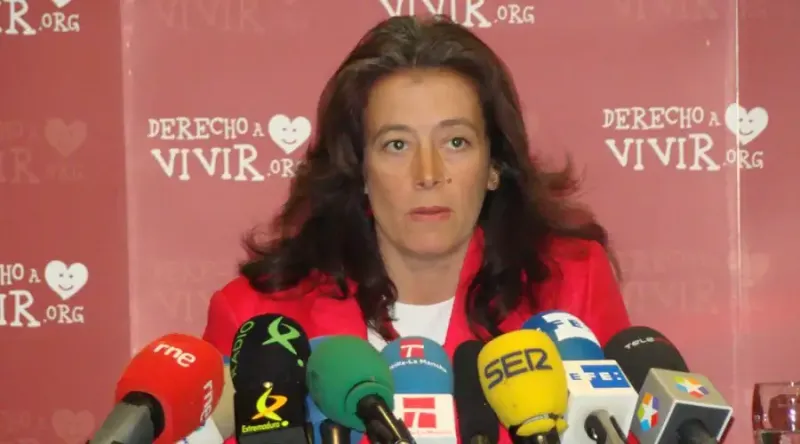
Denver Newsroom, Jul 21, 2022 / 13:31 pm (CNA).
Dr. Mónica López Barahona, a member of the Board of Directors of the Pontifical Academy for Life and president of the Jérôme Lejeune Foundation in Spain, has clarified that the recent publication of a book by the academy hasn’t changed the bioethical magisterium of Church.
“It’s not true that the Church or the Magisterium have changed their moral criteria regarding some questions of bioethics; not even that the Vatican has begun a process of reviewing these issues,” López stressed in a statement released in the form of an interview to which ACI Prensa, CNA’s Spanish language sister news agency, has had access.
“In no case does said volume represent an official declaration of the PAV and much less does it mean a change in the Magisterium of the Church, which, as is well known, is only conveyed through papal encyclicals, instructions from the Dicastery for the Doctrine of the Faith, and explicit magisterial declarations,” she said.
The controversy stems from a book published by the Vatican Publishing House presented as “a contribution that elaborates a Christian vision of life, expositing it from the perspective of an anthropology appropriate to the cultural mediation of faith in today’s world.”
“Theological Ethics of Life: Scripture, Tradition, and Practical Challenges,” is an Italian language, 528-page synthesis of a theological seminar sponsored by the PAV in 2021.
About 30 people participated in this seminar, not all members of the Pontifical Academy for Life, “theologians and philosophers of different places of origin and intellectual orientation,” López explained.
The PAV board member pointed out that “some of the statements contained in the volume seem to be in contrast to the Magisterium of the Church.”
Among them are pronouncements in favor of “the possible legitimacy of contraception in certain cases,” in support of “the legitimacy of certain homologous assisted reproduction techniques under certain conditions (without loss of embryos),” and supporting “the non-existence of intrinsically evil actions.”
These positions violate what is prescribed in the magisterial documents Humanae vitae, Donum vitae, and Veritatis splendor, which, on the other hand, are affirmed in other parts of the book, according to López.
López also stated that “not all the contributions of the people who participated in the seminar are included in the text” and that “there were discordant and critical voices with what was stated in said text.”
The doctor noted that such a publication “needs a more prudent process of development and publication and with all the departments involved, such as the Dicastery for the Doctrine of the Faith, which in my way of thinking should have reviewed the text prior to publication.”
The doctor explained that a dialogue between members of the PAV and people who hold other bioethical criteria is not uncommon.
However, such discussion “should have been brought to the attention of the PAV Board of Directors” for its assessment, and should “not have been published until further consideration and assessment by the competent authority of the Church.”
López stressed that “the book is not an official declaration of the Pontifical Academy for Life on these issues” and that it does not represent “the moral criteria of all its members,” adding that “some were disconcerted when they saw the news about the publication of the book and the seminar, about which they knew nothing until that moment.”
She noted that numerous people “have seen this news with surprise and have called and written to us,” acknowledging that the book “has caused confusion and scandal in the news media and social media.”
This story was first published by ACI Prensa, CNA’s Spanish-language news partner. It has been translated and adapted by CNA.
If you value the news and views Catholic World Report provides, please consider donating to support our efforts. Your contribution will help us continue to make CWR available to all readers worldwide for free, without a subscription. Thank you for your generosity!
Click here for more information on donating to CWR. Click here to sign up for our newsletter.




Thank you for these words of clarification and retraction (?) from a board member.
Butt, where pray tell, is Cardinal Paglia, President of the Pontifical Academy for Life (and Grand Chancellor of the gutted and renamed John Paul II Pontifical Theological Institute for Marriage and Family Sciences)? The publication hit the streets on his watch.
Perhaps the clue is in the board member’s mention of Humanae vitae, Donum vitae, and Veritatis splendor, none of which has received much or any air time in the past nine years.
Anonymous sources report that, in response, Paglia has hastened to his cathedral church of the Diocese of Terni-Narni-Amelia to finally remove the homoerotic wall mural of himself and others, but reliable sources are unable to confirm this rumor.
And a picture is worth a thousand words…
https://www.lifesitenews.com/news/leading-vatican-archbishop-featured-in-homoerotic-painting-he-commissioned
To quote Fr. Z(uhlsdorf): “B as in B, S as in S”!
Although Ms Barahona asserts there’s no official change in Catholic doctrine on contraception, the “Vatican Publishing House presented as a contribution that elaborates a Christian vision of life, expositing it from the perspective of an anthropology appropriate to the cultural mediation of faith in today’s world”, has been the game plan of this pontificate since day one.
Claim orthodoxy, suggest by unofficial letters, public statements, Apostolic exhortation [Amoris] key appointments change in practice,heterodox in nature, is growing. Furthermore, this has not been addressed, every indication is that it’s fine. So the strategy quite effectively is changing Catholicism into something other than Christ intended.